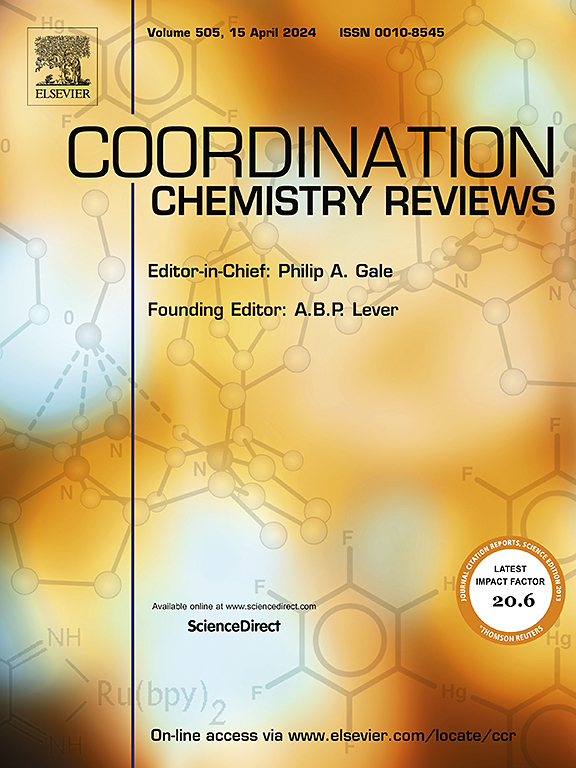Host-guest interactions in the confined spaces of metal–organic frameworks: Design principles, characterizations, and applications
IF 20.3
1区 化学
Q1 CHEMISTRY, INORGANIC & NUCLEAR
引用次数: 0
Abstract
Metal–organic frameworks (MOFs) are revolutionizing porous materials with their incredible structures and functionalities that have been extensively explored in many fields. Unlike traditional porous materials, MOFs offer a unique opportunity for precise design and modification of the porosities and pore environments. Their nanoscale confined spaces with specific shapes and surface functionalities can selectively interact with certain guest molecules through host-guest interactions, unlocking enhanced performance and related mechanisms that were previously undiscovered. Through advanced experimental and theoretical techniques, the high crystallinity of MOFs allows for detailed and in-depth studies of the structure-performance relationships, leading to breakthroughs in design and optimization. This review delves into recent advancements in the construction, characterization, and host-guest applications of MOF-based systems, showcasing their design strategies for remarkable functionality, porosity, and flexibility. The latest progress in adsorption, separation, catalysis, energy storage, crystalline sponge (CS), and sensing are discussed, unraveling the endless possibilities of MOFs and their challenges.
金属有机框架密闭空间中的主客体相互作用:设计原理、特性和应用
金属有机框架(MOFs)以其令人难以置信的结构和功能性为多孔材料带来了革命性的变化,并在许多领域得到了广泛的探索。与传统的多孔材料不同,MOF 为精确设计和改变孔隙率和孔隙环境提供了独特的机会。它们具有特定形状和表面功能的纳米级密闭空间可以通过主客体相互作用选择性地与某些客体分子相互作用,从而释放出以前尚未发现的增强性能和相关机制。通过先进的实验和理论技术,MOFs 的高结晶性允许对结构-性能关系进行详细深入的研究,从而在设计和优化方面取得突破。这篇综述深入探讨了基于 MOF 的系统在构建、表征和主客体应用方面的最新进展,展示了其卓越功能、多孔性和灵活性的设计策略。文章讨论了吸附、分离、催化、储能、结晶海绵 (CS) 和传感领域的最新进展,揭示了 MOFs 的无限可能性及其面临的挑战。
本文章由计算机程序翻译,如有差异,请以英文原文为准。
求助全文
约1分钟内获得全文
求助全文
来源期刊

Coordination Chemistry Reviews
化学-无机化学与核化学
CiteScore
34.30
自引率
5.30%
发文量
457
审稿时长
54 days
期刊介绍:
Coordination Chemistry Reviews offers rapid publication of review articles on current and significant topics in coordination chemistry, encompassing organometallic, supramolecular, theoretical, and bioinorganic chemistry. It also covers catalysis, materials chemistry, and metal-organic frameworks from a coordination chemistry perspective. Reviews summarize recent developments or discuss specific techniques, welcoming contributions from both established and emerging researchers.
The journal releases special issues on timely subjects, including those featuring contributions from specific regions or conferences. Occasional full-length book articles are also featured. Additionally, special volumes cover annual reviews of main group chemistry, transition metal group chemistry, and organometallic chemistry. These comprehensive reviews are vital resources for those engaged in coordination chemistry, further establishing Coordination Chemistry Reviews as a hub for insightful surveys in inorganic and physical inorganic chemistry.
 求助内容:
求助内容: 应助结果提醒方式:
应助结果提醒方式:


